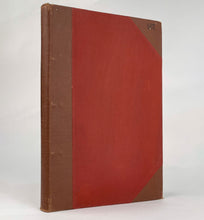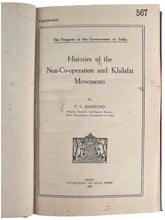Rare and Confidential
BAMFORD, Percival Clifford. Histories of the Non-Co-Operation and Khilafat Movements. Delhi: Government of India Press. 1925.
8vo. Contemporary Indian government binding of cloth-covered boards, spine lettered in black, accession number printed in black on one corner and repeated on title-page; pp. xiv, 270; lower cover with one breakage to corner (holding firm), title-page expertly re-inserted, final page a little spotted, otherwise a very good copy of a great rarity.
Confidential governement publication, exceedingly rare, on the co-ordinated anti-Imperial Muslim movement and its co-operation with Gandhi's strategies of the Congress Party.
'The Khilafat movement (1919-1924) was an agitation by Indian Muslims allied with Indian nationalism in the years following World War I. Its purpose was to pressure the British government to preserve the authority of the Ottoman Sultan as Caliph of Islam following the breakup of the Ottoman Empire at the end of the war … The Khilafat leaders, most of whom had been imprisoned during the war because of their pro-Turkish sympathies, were already active in the Indian nationalist movement. Upon their release in 1919, they espoused the Khilafat cause as a means to achieve pan-Indian Muslim political solidarity in the anti-British cause. The Khilafat movement also benefited from Hindu-Muslim cooperation in the nationalist cause that had grown during the war, beginning with the Lucknow Pact of 1916 between the Indian National Congress and the Muslim League, and culminating in the protest against the Rowlatt anti-Sedition bills in 1919. The National Congress, led by Mahatma Gandhi (1869-1948), called for non-violent non-cooperation against the British. Gandhi espoused the Khilafat cause, as he saw in it the opportunity to rally Muslim support for nationalism. The ‘Ali brothers and their allies, in turn, provided the non-cooperation movement with some of its most enthusiastic followers' (International Encyclopedia of the Wirst World War, online).
The Indian government and the British had clearly infiltrated both movements and the result is what is presented in this rare document.
WorldCat locates one copy in the University Library, Pantnagar, Uttarakhand, and in the British Library; no trace of this title having ever appeared at an auction or in the trade.
#2120427




